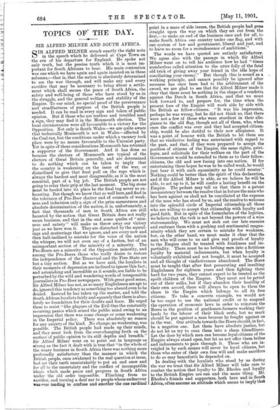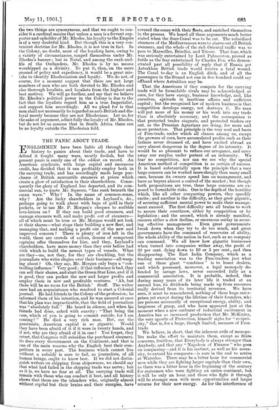TOPICS OF THE DAY.
SIR ALFRED MILNER AND SOUTH AFRICA.
SIR ALFRED MILNER struck exactly the right note in the speech which he delivered at Cape Town on the eve of his departure for England. He spoke not only truth, but the precise truth which it is most im- portant for South Africans to hear. His main contention was one which we have again and again insisted on in these column s,—that is, that the nation is absolutely determined to see the war through, and will make any and every sacrifice that may be necessary to bring about a settle- ment which shall secure the peace of South Africa, the safety and well-being of those who have stood by us in the struggle, and the general welfare and stability of the Empire. To our mind, no special proof of the perseverance and steadfastness of purpose of the British people is needed. It can be read in every sign and token of public opinion. But if those who are restless and troubled need a sign, they may find it in the Monmouth election. The local circumstances were all favourable to a victory for the Opposition. Not only is South Wales—we are quite aware that technically Monmouth is not in Wales—affected by the Coal-tax, but the conditions under which a vacancy took place were by no means favourable to the Unionist party. Yet in spite of these considerations Monmouth has returned a supporter of the Government. And it has clone so because the electors of Monmouth are typical of the electors of Great Britain generally, and are determined to do nothing which can be taken to imply that the country is weakening on the issue of the wax, or disinclined to give that final pull on the rope which is always the hardest and most disagreeable, as it is the most essential, part of a big job. The British people are not going to relax their grip at the last moment. The big stone must be hauled into its place be the final tug never so ex- hausting. But though we know that so well here, and. find in the tolerance of Pro-Boer chatter and of counsels of weak- ness and indecision only a sign of the grim earnestness and absolute determination of the nation, it is, unfortunately, a fact that thousands of men in South Africa are still haunted by the notion that Great Britain does not really mean business, and that in the end some qualm of "nice- ness and satiety" will make us throw away our victory just as we have won it. They are disturbed by the squeal- ings and mutterings that we ignore, and. are every now and then half-inclined to mistake for the voice of the nation the whisper, we will not even say of a faction, but of an unimportant section of the minority of a minority. The Pro-Boers are a minority of the Opposition minority, and among the Pro-Boers those who really desire to restore the independence of the Transvaal and the Free State are but a tiny section. But as we have said, the loyalists in their moments of depression are inclined to ignore this fact; and astonishing and incredible as it sounds, are liable to be perturbed by the wild and wandering words of irresponsible journalists in Pro-Boer newspapers. With great good sense, Sir Alfred Milner has not, as so many Englishmen are apt to do, ignored this tendency as something too absurd even to be denied.. Instead. he has taken up the matter, and told the South African loyalists fairly and squarelythat there is abso- lutely no foundation for their doubts and fears. He urged them to resist "like plagues of the Evil One the constantly recurring panics which seized the public mind owing to an impression that there was some change or some weakening in the Imperial policy. There was absolutely no reason for any anxiety of the Lind. No change, no weakening, was possible. The British people had made up their minds, and they must look from the ever-changing froth on the surface of public opinion to its still depths and breadth." Sir Alfred Milner went on to point out in language as strong as the fact it dealt with is true that "in the whole of the weary business in South Africa there was nothing more profoundly satisfactory than the manner in which the British people, once awakened to the real question at issue, had set their teeth unmistakably to put an end once and for all to the uncertainty and the conflict of incompatible ideals which made peace and progress in South Africa under the old order impossible. Flinching from no sacrifice, and turning a deaf ear to people whose endeavour was ever tending to confuse and smother the one cardinal point in a mass of side issues, the British people.had gone straight upon the way on which they set out from the first,—to make an end of the business once and for all, to make South Africa one country under one flag, and with one system of law and government, liberal and just, and to leave no room for a recrudescence of ambitions."
The words we have quoted are entirely satisfactory. We agree also with the passage in which Sir Alfred Milner went on to tell his audience how he had "times numberless called. attention to the utter folly of the fatal old trick of giving away your friend in the idle hope of conciliating your enemy." But though this is sound as a working principle, and cannot possibly be ignored after recourse has once been had to the arbitrament of the sword, we are glad to see that Sir Alfred Milner made it clear that there must be nothing in the shape of a vendetta against the Dutch in South Africa, and that we must look forward to, and prepare for, the time when the present foes of the Empire will work side by side with the British as fellow-citizens. "It was his impression, perhaps he was wrong, but he did not think so, that there were not a few of those who were sturdiest in their alle- giance to the old flag, though not all of them, who, when once the conflict was over and they had accepted. citizen- ship, would be also dutiful to their new allegiance. It was a point of honour with the British to let them see that no vindictive feeling was entertained with regard to the past, and that, if they were prepared to accept the position of citizens of the Empire, the same rights, privi- leges, and solicitude for their welfare on the part of the Government would be extended to them as to their fellow- citizens, the old and new fusing into one nation. If for entertaining these hopes he was to be called weak, he would just bear it with such equanimity as he could muster." Nothing could be better than the spirit of this declaration, and if Sir Alfred Milner is able, as we believe he will be able, to act up to it, he will confer a lasting benefit on the Empire. The pedant may tell us that there is a patent inconsistency between the resolve that in future the man who has been against us shall not be conciliated at the expense of the man who has stood by us, and the resolve to welcome into the splendid circle of Imperial citizenship all those who are wining to accept that citizenship with loyalty and good faith. But in spite of the formularies of the logician, we believe that the task is not beyond the powers of a wise statesmanship. We must not seek out our late enemies and embrace them with a gushing and sentimental magna- nimity which they are certain to mistake for weakness, but, on the other hand, we must make it clear that the men who will come to us and give real proofs of loyalty to the Empire shall be treated with frankness and im- partiality. There must be no bribing men into a fictitious loyalty by material inducements, but when loyalty is voluntarily exhibited and not bought, it must be accepted. and all thought of vindictiveness abandoned. The Boers must be taught that after first persecuting and. insulting Englishmen for eighteen years and then fighting them hard for two years, they cannot expect to be treated as the spoilt children of the Empire. They must not be petted out of their sulks, but if they abandon their hostility of their own accord, there will always be open to them the share in the Empire which belongs to all its free citizens. To take a concrete example, we would not be too eager to use the national credit or to suspend the operation of economic laws in order to reinstate the Boers in the position of gentlemen-farmers working their lands by the labour of their black serfs, but no mark should be put against a man because he fought against us in the war. Our attitude towards the Boers should, in fact, be a negative one. Let them have absolute justice, but do not let us try to coax them into a sham friendliness. Let the door by which men can become loyal citizens of the Empire always stand open, but let us not offer them bribes and inducements to pass through it. Those who are in- veigled in by such means will never be loyal citizens, but those who enter of their own free will and make sacrifices to do so may henceforth be depended on. In dealing with the loyalists who stood by us during the war we trust that Sir Alfred Milner will take care to combat the notion that loyalty to Mr. Rhodes and loyalty to the British Empire are one and the same thing. Mr. Rhodes's friends and. supporters, both here and. in South Africa, often assume an attitude which seems to imply that the two things are synonymous, and. that we ought to con- sider it a cardinal maxim that unless a man is a fervent snp- porter and upholder of Mr. Rhodes. his loyalty to theEmpire is of a very doubtful End. But though this is a very con- venient doctrine for Mr. Rhodes, it is not true in fact. In the Colony, no doubt, most of the loyalist have, owing te a variety of circumstances, ranged themselves under Mr. Rhodes's banner; but in Natal, and. among the rank-and.- file of the Outlanders, Mr. Rhodes is by no means worshipped as a divinity. To put it, then, on the mere ground of policy and expediency, it would. be a great Mis- take to identify Rhodesianism and loyalty. We do not, of course, for a moment suggest that there are not large numbers of men who are both devoted to Mr. Rhodes and also thorough loyalists, and, loyalists from the highest and best motives. We will go further, and say that we believe Mr. Rhodes's political power in the Colony is due to the fact that the loyalists regard. him as a true Imperialist, and support him accordingly. All we plead for is that men shall not necessarily be regarded as anti-British and dis- loyal merely because they are not Rhodesians. Let us, for the sake of argument, admit fully the loyalty of Mr. Rhodes, but do not let us assume that in South Africa there can be no loyalty outside the Rhodesian fold.







































 Previous page
Previous page